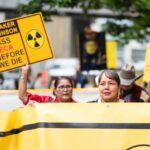In order to join the European Union (EU), several Eastern European states agreed to phase out their Soviet-era nuclear reactors, which other EU members–still haunted by the 1986 Chernobyl accident–thought were too dangerous to operate. But such closures have made these countries even more dependent on Russian natural gas supplies. This dependency caused a near-crisis last year when a pricing dispute led to the shutoff of Russian natural gas to Europe in the middle of winter. The current financial crisis has only made matters worse, as the former Eastern Bloc countries have struggled to raise capital to build energy alternatives (e.g., new power plants) or to connect their grids to the rest of Europe.
For instance, consider Bulgaria. In January, the government-owned utility Bulgargaz said that it was only able to provide about one-half of the country’s normal gas supply because of the Russian gas shutoff. Tens of thousands of households throughout the country had no gas, while many factories ran skeletal shifts. During the crisis, Bulgarian President Georgi Purvanov wanted to restart two 1980s Soviet-era nuclear reactors that had been shuttered in 2006 when the country joined the EU. He stated his reasons bluntly: “A more critical situation is hardly possible.” But other EU members balked at the request, because of the perceived safety risks.
Sadly, the situation in Lithuania is worse. The EU has insisted that Vilnius close its final Chernobyl-style reactor this year, even though it provides three-quarters of the country’s electricity. The government hasn’t lined up a replacement so it likely will be forced to rely on Russian natural gas for years to come. The only other option will be Russian controlled, too. Moscow plans to build a new nuclear plant in its neighboring enclave of Kaliningrad that Lithuania and its neighbors could draw electricity from. Such a situation of continued Russian dependence is anathema to the Baltic states, but bickering has slowed the development of alternatives. A new Lithuanian nuclear power plant, for example, which would provide electricity to Lithuania, Estonia, Latvia, and Poland, has been delayed until 2018, according to Lithuanian officials; outside experts say it won’t open before 2020. The countries can’t decide how to divvy up ownership of the project.
The Bulgarian and Lithuanian reactors were shut down despite a 2003 judgment by the World Association of Nuclear Operators (WANO), a peer-review group formed after Chernobyl by nuclear plant operators, which found that such a step wasn’t necessary. After more than a decade of safety upgrades instigated by the EU and International Atomic Energy Agency, WANO ruled that the plants were at the level of Western ones of similar age. The association was even more emphatic four years later, announcing, “No technical reasons exist for the early closure.”
Late last year, Slovakia shut down its final Soviet-era plant. The shutdown occurred even though the country had recently replaced the plant’s emergency core cooling systems and modernized its control systems. (Along these lines, Ukraine, the home of Chernobyl, also has received assistance to replace its still-functioning reactors at the Chernobyl site with newer, safer models.) In fact, Western European regulators concluded in 2000 that Slovakia’s nuclear regulatory regime was comparable to that of more established EU members. To avoid any potential energy shortfalls, Slovakia has built a new reactor financed in part by German export credits.
For most of the other Eastern European countries, though, the ongoing global financial crisis has made securing financing for new power plants exceedingly difficult. Many borrowed heavily in dollars and euros during the boom years, based on the belief that bright economic prospects would accompany their increasing integration into Western economic institutions. Instead their debt payments have ballooned as their currency values have plummeted compared with the euro and dollar. In the past few months, riots have broken out in Latvia, the result of austerity measures imposed in response to an International Monetary Fund (IMF) bailout. Similarly, Lithuania has kept its head above water by instituting painful austerity measures and has seen smaller protests and clashes, as has Bulgaria. IMF chief Dominique Strauss-Kahn recently described Latvia, Hungary, Belarus, and Ukraine as particularly vulnerable. “It may worsen in the coming months,” he told the BBC. “The situation is really, really serious.”
These particular financial problems have come on top of broader financial problems for the global nuclear energy industry. Few utilities or other private investors seem willing to put money into the relatively risky nuclear energy sector at a time of capital shortages and slackened energy demand. Again, Bulgaria is a case in point. It has been unable to find private financing for a new Russian nuclear power plant project it hopes will replace the one it shut down. Slated to include two modern 950-megawatt pressurized water reactors, it would be the first Russian-built nuclear power plant on EU soil. As a financing alternative, Sofia is turning to Moscow to see if it will fulfill a $4.9 billion loan offer former Russian President Vladimir Putin made last year. “We hoped that we would not need to use that resource, but in the current situation it would be good to find out on what terms we can get the loan,” the country’s Economy Minister Petar Dimitrov told Bulgarian National Radio.
As the Bulgarian situation demonstrates, the crisis could put the Russian state-owned nuclear energy giant Rosatom in the driver’s seat when it comes to further nuclear energy development in Eastern Europe. Russia has been positioning itself for this possibility, striking strategic agreements with key Western European corporate partners such as Italy’s two main energy companies, ENI Power and ENEL, and Germany’s Siemens, which could allow it to both re-enter its old markets and assuage EU safety concerns. While the financial crisis has certainly impacted Russia and reduced funds available to its nuclear energy industry, Rosatom still benefits from its status as a government-owned entity, allowing it to get better terms from private financiers than would otherwise be possible.
So ironically, the EU’s push to eliminate older Soviet-era nuclear reactors and attempts by Central and Eastern European countries to lessen their reliance on Russian natural gas could actually give Russia’s nuclear energy industry a new, stronger hold on the region.
Together, we make the world safer.
The Bulletin elevates expert voices above the noise. But as an independent nonprofit organization, our operations depend on the support of readers like you. Help us continue to deliver quality journalism that holds leaders accountable. Your support of our work at any level is important. In return, we promise our coverage will be understandable, influential, vigilant, solution-oriented, and fair-minded. Together we can make a difference.
Topics: Nuclear Energy, Opinion















